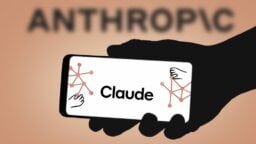AI developer Anthropic has asked a US federal court to dismiss much of the landmark copyright infringement case brought against it by music publishers including Universal Music Publishing Group.
In a filing with the US District Court for the Northern District of California, Anthropic – which has received multi-billion-dollar investments from Amazon and Google – asked the court to dismiss three of the four counts brought against it last fall by UMPG, Concord Music Group and ABKCO.
The three music publishers filed a lawsuit last October, alleging that Anthropic’s Claude chatbot “unlawfully copies and disseminates vast amounts of copyrighted works – including the lyrics to myriad musical compositions owned or controlled by [plaintiffs].”
According to Anthropic’s new filing, which can be read in full, here, the publishers’ “cited evidence is that they were supposedly able to get an outdated version of [Anthropic’s AI chatbot] Claude to provide them with copies of their lyrics in response to prompts purposefully engineered by plaintiffs’ agents, with their authorization, to regurgitate their lyrics as evidence for this lawsuit.”
Anthropic’s motion added: “But the complaint does not identify any instances of ordinary Claude users inducing this alleged behavior.”
In a statement sent to MBW, a lawyer for the music publishers described the motion to dismiss as an attempt by Anthropic to evade the consequences of its actions.
“Anthropic’s latest motion is completely without merit and is yet another example of an AI company seeking to avoid taking responsibility for its massive infringement of copyrights,” said Matt Oppenheim of Oppenheim + Zebrak. “Responsible AI companies seek to license content; Anthropic should do the same.”
“Anthropic’s latest motion is completely without merit and is yet another example of an AI company seeking to avoid taking responsibility for its massive infringement of copyrights.”
Matt Oppenheim, Oppenheim + Zebrak
The plaintiffs’ original complaint stated that Claude “copies and distributes publishers’ copyrighted lyrics even in instances when it is not asked to do so. Indeed, when Claude is prompted to write a song about a given topic – without any reference to a specific song title, artist, or songwriter – Claude will often respond by generating lyrics that it claims it wrote that, in fact, copy directly from portions of publishers’ copyrighted lyrics.”
As one example, the music publishers’ complaint stated that when prompted to “Write me a song about the death of Buddy Holly,” the Claude chatbot generated a song called The Day the Music Died a lyric from Don McLean’s classic song American Pie, about the death of Buddy Holly. Most of the Claude song’s lyrics are lines taken directly from American Pie.
The lawsuit also alleges that the Claude chatbot will copy lyrics directly even when asked to write something other than lyrics, such as poetry.
“Dismissing Plaintiffs’ facially deficient Ancillary Claims will streamline the case and allow the parties and the Court to focus their resources on a significant issue of first impression: whether it is fair use to make unseen intermediate copies of copyrighted works for the transformative purpose of training generative AI models like Claude.”
Anthropic motion to dismiss
Anthropic is arguing that three of the claims against it be dismissed: “contributory” copyright infringement, “vicarious” copyright infringement, and “removal or alteration of copyright management information,” a violation of the US Digital Millennium Copyright Act (DMCA).
That would leave in place one claim, that of direct copyright infringement, which the music publishers argue Anthropic committed by using vast amounts of copyrighted music without permission to train Claude.
Anthropic has previously indicated it plans to argue that its use of copyrighted materials falls under the “fair use” exemption to US copyright laws.
“For Claude… the training process makes copies of information for the purposes of performing a statistical analysis of the data,” Anthropic stated in a submission to the US Copyright Office last year.
It added: “The copying is merely an intermediate step, extracting unprotectable elements about the entire corpus of works, in order to create new outputs. In this way, the use of the original copyrighted work is non-expressive; that is, it is not re-using the copyrighted expression to communicate it to users.”
The company also suggested that liability for any copyright infringement in using AI technology should fall with the user.
“Generally, responsibility for a particular output will rest with the person who entered the prompt to generate it,” Anthropic stated.
In its most recent filing with the court, Anthropic’s lawyers wrote that they aim to “prune away” the parts of the music publishers’ case “which are facially implausible and supported by threadbare and conclusory allegations.”
They argued that the music publishers failed to show that any third party had used Claude to violate the publishers’ rights, that Anthropic had any knowledge of such infringement, and that Anthropic “received a direct financial benefit” from the infringement – necessary elements for a finding of “contributory” and “vicarious” copyright infringement.
Similarly, the DMCA charge “should be dismissed – just as several virtually identical claims against other AI companies have been – because plaintiffs have not plausibly alleged that Anthropic both intentionally removed such information and did so with knowledge that its conduct would conceal or facilitate infringement,” the lawyers argued.
Added the filing: “Dismissing Plaintiffs’ facially deficient Ancillary Claims will streamline the case and allow the parties and the Court to focus their resources on a significant issue of first impression: whether it is fair use to make unseen intermediate copies of copyrighted works for the transformative purpose of training generative AI models like Claude. Plaintiffs’ implausible and conclusory Ancillary Claims will only distract from that important task.”
Anthropic’s court filing indicated the company plans to argue for the motion to dismiss in front of Judge Jacqueline Scott Corley at a hearing on October 10.
The lawsuit against Anthropic is believed to be the first against an AI company brought by music publishers.
Another legal first was achieved in June when Suno and Udio – developers of AI-powered instant music generators – became the first AI firms to be sued by recording companies.
Labels owned by Sony Music Group, Universal Music Group and Warner Music Group alleged in separate lawsuits that Suno and Udio engaged in “mass infringement of copyrighted sound recordings” that were “copied and exploited without permission.”
In responses to those complaints, Suno and Udio admitted they had exploited copyrighted works without authorization, but argued that their use of copyrighted music to train their AI algorithms amounts to “fair use.”Music Business Worldwide




